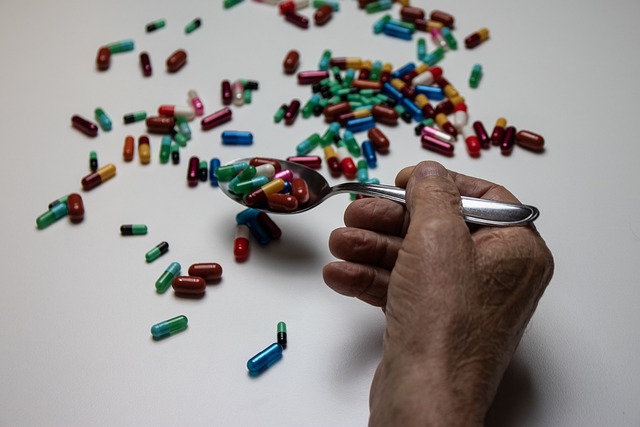Depression treatment programs offer comprehensive, personalized approaches combining psychological therapies (CBT, IPT, MBCT), medication management (SSRIs), lifestyle interventions, and support groups. These integrate effective strategies like exercise, mindfulness, therapy, and social connections to target symptoms, prevent relapse, and improve mental well-being. Medication, when prescribed, regulates brain chemicals and provides a stable foundation for recovery alongside psychotherapy. Tailored programs build resilience through coping mechanisms like cognitive reframing, stress management, and adaptive strategies for effective long-term management.
Depression management plans are essential tools for navigating the path to recovery. This comprehensive guide explores various aspects of effective depression treatment, from understanding specialized programs to adopting lifestyle changes. We delve into proven therapy approaches, emphasizing personalized care and the power of self-management. Additionally, we examine medication’s role and strategies to build resilience, offering a holistic perspective on managing depression. Discover practical steps towards improved mental well-being through these insightful sections: Understanding Depression Treatment Programs, Effective Therapy Approaches, Personalized Management Planning, Lifestyle Modifications, Medication Insights, and Building Resilience.
Understanding Depression Treatment Programs: An Overview

Depression treatment programs are comprehensive approaches designed to help individuals manage and overcome symptoms of depression. These programs often include a combination of psychological therapies, medication management, lifestyle interventions, and support groups. The primary goal is to provide tailored care that addresses the unique needs of each person struggling with depression.
Understanding these programs involves recognizing their multi-faceted nature. Cognitive Behavioral Therapy (CBT), for instance, focuses on identifying and changing negative thought patterns while encouraging healthier behaviors. Other evidence-based approaches like Interpersonal Therapy (IPT) target relationships and social factors contributing to depression. Medication, such as selective serotonin reuptake inhibitors (SSRIs), can help balance brain chemicals associated with mood regulation. By integrating these various elements, depression treatment programs offer a holistic approach aimed at improving mental well-being and enhancing quality of life.
Identifying Effective Therapy Approaches for Depression

When developing a depression management plan, identifying effective therapy approaches is paramount. Cognitive Behavioral Therapy (CBT), for instance, has proven successful in addressing negative thought patterns and behaviors that contribute to depression. This evidence-based method helps individuals challenge and replace distorted beliefs with more realistic and positive ones, fostering improved mood and emotional well-being. Other popular and effective therapies include Interpersonal Psychotherapy (IPT) and Mindfulness-Based Cognitive Therapy (MBCT), each tailored to address specific aspects of depression such as interpersonal issues or recurrent depressive episodes.
Depression treatment programs should be personalized, considering the unique needs and preferences of the individual. While some may benefit from one-on-one therapy sessions, others might find group therapy settings more conducive to recovery. Integrating various therapy approaches within a comprehensive depression management plan can significantly enhance outcomes. Additionally, combining these therapies with medication, if prescribed by a healthcare professional, has shown promising results in managing symptoms and preventing relapse.
Creating a Personalized Depression Management Plan

Creating a personalized depression management plan is a proactive step toward overcoming this common mental health challenge. It involves understanding your unique triggers, symptoms, and coping mechanisms. This tailored approach ensures that your treatment aligns with your specific needs, making it more effective. A good starting point is to identify activities and strategies that have helped manage symptoms in the past, such as exercise, therapy, or mindfulness practices.
Your plan should also incorporate support systems, whether it’s reaching out to friends, joining a support group, or consulting professionals like therapists or counselors. Regularly reviewing and adjusting your strategy based on progress is key. Depression treatment programs often emphasize this dynamic nature, allowing for flexibility as you navigate different phases of recovery.
Lifestyle Changes to Support Mental Well-being

In addition to professional help and therapy, implementing lifestyle changes can significantly support mental well-being as part of a comprehensive depression management plan. A balanced diet, regular exercise, and adequate sleep are cornerstone components in combating depression. These activities not only boost mood but also regulate hormones and neurotransmitters that influence emotion and cognitive function.
Additionally, cultivating mindfulness practices like meditation or yoga can help individuals develop a greater sense of self-awareness and emotional regulation. Reducing stressors through relaxation techniques and setting realistic goals can also lessen the impact of depressive symptoms. Connecting with others—whether through social groups, support networks, or community activities—is another crucial lifestyle change that fosters a sense of belonging and reduces feelings of isolation, which are common in depression treatment programs.
The Role of Medication in Depression Treatment

Medication plays a pivotal role in many depression treatment programs, offering a crucial tool for managing symptoms and restoring balance. Antidepressant medications work by altering the levels of certain brain chemicals, such as serotonin, norepinephrine, and dopamine, which are known to influence mood and emotions. These drugs can help alleviate symptoms like persistent sadness, loss of interest in activities once enjoyed, changes in appetite and sleep patterns, fatigue, and difficulty concentrating.
The choice and dosage of medication are tailored individually, depending on the severity of symptoms, personal history, and potential side effects. While antidepressants can take several weeks to reach full effect, they provide a consistent foundation for recovery, often combined with psychotherapy or other therapeutic interventions for comprehensive depression treatment programs.
Building Resilience and Coping Strategies

Building resilience is a crucial component of effective depression management plans. It involves learning to navigate life’s challenges with increased adaptability and a positive mindset. Through various depression treatment programs, individuals can develop coping strategies tailored to their unique experiences. These strategies may include mindfulness practices, cognitive reframing techniques, and stress management skills designed to help one recognize and challenge negative thought patterns.
By fostering resilience, people affected by depression gain the ability to bounce back from setbacks and navigate difficult situations with more ease. Coping mechanisms can range from engaging in physical activity, connecting with supportive networks, keeping a journal, or pursuing hobbies that bring joy. Incorporating these activities into daily routines can significantly enhance overall well-being and play a vital role in preventing relapse during depression treatment.
